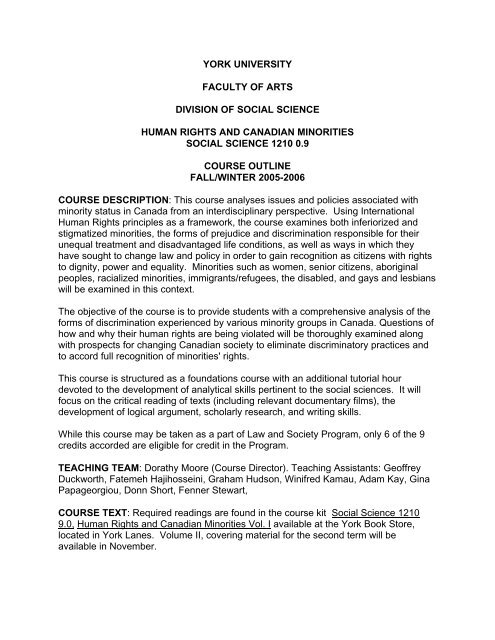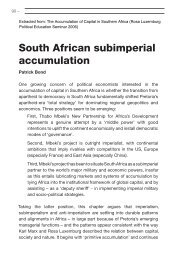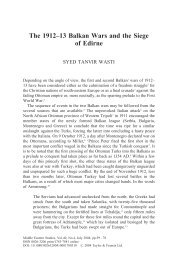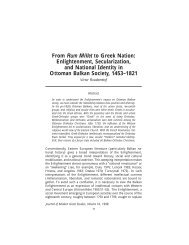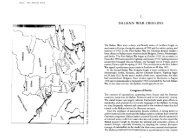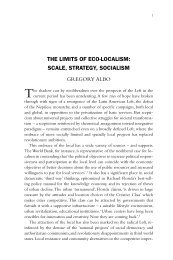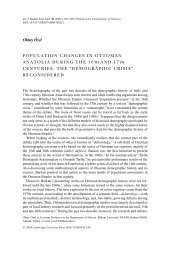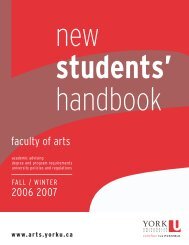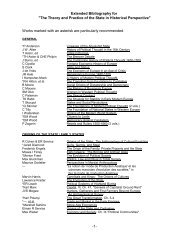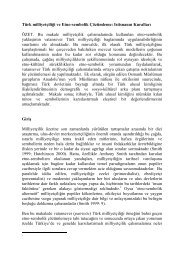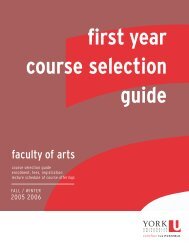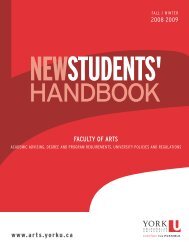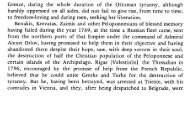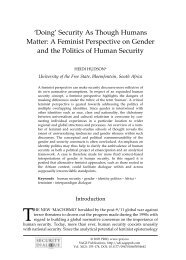york university faculty of arts division of social science human rights ...
york university faculty of arts division of social science human rights ...
york university faculty of arts division of social science human rights ...
You also want an ePaper? Increase the reach of your titles
YUMPU automatically turns print PDFs into web optimized ePapers that Google loves.
YORK UNIVERSITY<br />
FACULTY OF ARTS<br />
DIVISION OF SOCIAL SCIENCE<br />
HUMAN RIGHTS AND CANADIAN MINORITIES<br />
SOCIAL SCIENCE 1210 0.9<br />
COURSE OUTLINE<br />
FALL/WINTER 2005-2006<br />
COURSE DESCRIPTION: This course analyses issues and policies associated with<br />
minority status in Canada from an interdisciplinary perspective. Using International<br />
Human Rights principles as a framework, the course examines both inferiorized and<br />
stigmatized minorities, the forms <strong>of</strong> prejudice and discrimination responsible for their<br />
unequal treatment and disadvantaged life conditions, as well as ways in which they<br />
have sought to change law and policy in order to gain recognition as citizens with <strong>rights</strong><br />
to dignity, power and equality. Minorities such as women, senior citizens, aboriginal<br />
peoples, racialized minorities, immigrants/refugees, the disabled, and gays and lesbians<br />
will be examined in this context.<br />
The objective <strong>of</strong> the course is to provide students with a comprehensive analysis <strong>of</strong> the<br />
forms <strong>of</strong> discrimination experienced by various minority groups in Canada. Questions <strong>of</strong><br />
how and why their <strong>human</strong> <strong>rights</strong> are being violated will be thoroughly examined along<br />
with prospects for changing Canadian society to eliminate discriminatory practices and<br />
to accord full recognition <strong>of</strong> minorities' <strong>rights</strong>.<br />
This course is structured as a foundations course with an additional tutorial hour<br />
devoted to the development <strong>of</strong> analytical skills pertinent to the <strong>social</strong> <strong>science</strong>s. It will<br />
focus on the critical reading <strong>of</strong> texts (including relevant documentary films), the<br />
development <strong>of</strong> logical argument, scholarly research, and writing skills.<br />
While this course may be taken as a part <strong>of</strong> Law and Society Program, only 6 <strong>of</strong> the 9<br />
credits accorded are eligible for credit in the Program.<br />
TEACHING TEAM: Dorathy Moore (Course Director). Teaching Assistants: Ge<strong>of</strong>frey<br />
Duckworth, Fatemeh Hajihosseini, Graham Hudson, Winifred Kamau, Adam Kay, Gina<br />
Papageorgiou, Donn Short, Fenner Stewart,<br />
COURSE TEXT: Required readings are found in the course kit Social Science 1210<br />
9.0, Human Rights and Canadian Minorities Vol. I available at the York Book Store,<br />
located in York Lanes. Volume II, covering material for the second term will be<br />
available in November.
LECTURES: Lectures are held in Curtis Lecture Hall F on Wednesdays from 12:30-<br />
2:30 p.m.. While lecture attendance does not constitute a specific portion <strong>of</strong> your final<br />
grade per se, you should be aware <strong>of</strong> the fact that material will be covered that is not<br />
included in the reading kit, and it will always form a partial basis <strong>of</strong> response to exam<br />
questions. Given that lecture attendance is not mandatory, students who wish to chat,<br />
and otherwise be disruptive to their peers, need not attend. CELL PHONES MUST BE<br />
TURNED OFF DURING LECTURE HOURS: if you are expecting an emergency call,<br />
please do not attend the lecture—ask a friend to take notes for you.<br />
VIDEOS: there are a number <strong>of</strong> videos screened in lecture during the year. They are<br />
an important part <strong>of</strong> the course content and must be referenced in tests. Some might<br />
be helpful for referencing in your essay. If you miss a video in class, it can be viewed in<br />
the Sound and Moving Image Library—Main Floor, Scott Library.<br />
TUTORIALS: Tutorials are 2 hours each and students must participate in, and be<br />
present for both hours in order to be given credit. You are responsible for the material<br />
covered in tutorial whether or not you are in attendance. We suggest that you find a<br />
“buddy” in your tutorial that you can contact for relevant information if you are unable to<br />
attend. Tutorials will begin the week <strong>of</strong> Sept 12 th .<br />
ENROLMENT IN THIS COURSE IS TUTORIAL-BASED. YOU MUST BE ENROLLED<br />
IN A TUTORIAL AND ATTEND THE TUTORIAL IN WHICH YOU ARE REGISTERED,<br />
UNLESS THERE IS SOMEONE WHO WISHES TO SWITCH TUTORIALS WITH YOU.<br />
We will provide an opportunity for students to switch with each other at the end <strong>of</strong> the<br />
first two lectures. The appropriate form must be signed by both students and the<br />
Course Director, and submitted to the Social Science Office (S744R).<br />
TUTORIAL SCHEDULE:<br />
Type Day Start Time Duration Location<br />
TUTR 01 W 10:30 120 VH3000<br />
TUTR 02 W 8:30 120 VH3000<br />
TUTR 03 W 14:30 120 WC115<br />
TUTR 04 M 16:30 120 RS623<br />
TUTR 05 R 14:30 120 FC114<br />
TUTR 06 T 14:30 120 FC117<br />
TUTR 07 T 12:30 120 WC108<br />
TUTR 08 R 8:30 120 VH1022<br />
Continued next page…<br />
PLEASE NOTE:<br />
1. TUTORIALS ON OCTOBER 13 TH WILL NOT BE HELD BECAUSE OF THE<br />
2
OBSERVANCE OF YOM KIPPUR.<br />
2. ALL TUTORIALS DURING THE WEEK OF OCTOBER 24, 2005 WILL BE HELD IN<br />
SCOTT LIBRARY. CHECK WITH YOUR TUTORIAL LEADER ABOUT WHERE YOU<br />
SHOULD MEET.<br />
3. THERE ARE NO TUTORIALS HELD DURING THE WEEKS OF IN-CLASS TESTS.<br />
COURSE POLICIES<br />
The policies below will help you with the “rules <strong>of</strong> the road”: we want you to understand<br />
the basic premises on which the team operates so there are no surprises for you at any<br />
point in the year. Please read them carefully, and assume that all members <strong>of</strong> the team<br />
operate on the same rules.<br />
ACADEMIC DISHONESTY/PLAGIARISM: At the end <strong>of</strong> this syllabus, there is a<br />
University policy statement on Academic Dishonesty. PLEASE read the statement<br />
very carefully and make sure you are VERY CLEAR about what constitutes<br />
plagiarism and other forms <strong>of</strong> academic dishonesty. Explanations will be given in<br />
tutorials at which time any questions you have about it can be raised with your tutorial<br />
leader. "I didn't know", "I didn't understand", “I didn’t intend to”, or “I ran out <strong>of</strong> time…”<br />
do not constitute mitigating circumstances for committing the <strong>of</strong>fence, so please be<br />
sure you understand what constitutes academic dishonesty so you do not unwittingly<br />
engage in it. We take plagiarism very seriously: please do not jeopardize your<br />
academic career by engaging in it. To assist your understanding, you will be required to<br />
complete the Academic Integrity Tutorial and Quiz for submission at the Library<br />
tutorial during the week <strong>of</strong> October 24th.<br />
In addition to the Academic Integrity Tutorial and Quiz, you will be required to complete<br />
the Library Research Roadmap and Quiz. This will prepare you for the hands-on<br />
session at the library during the week <strong>of</strong> October 24 th . Although neither tutorial/quiz has<br />
a grade assigned to it, you will not be able to submit either part <strong>of</strong> the Library<br />
Assignment until such time as you have demonstrated that you have successfully<br />
completed both tutorial/quiz assignments. Having done the tutorial/quiz for another<br />
course, does not fulfil the requirement for this course.<br />
GRADING: All work is graded by your tutorial leader and reviewed by the teaching team<br />
before it is returned to you. All assigned grades in the lowest (D and below) and in the<br />
highest (A and A+) are systematically re-read by another team member. Requests for<br />
re-reads should be directed to your tutorial leader and be put in writing. Tutorial leaders<br />
will raise outstanding issues with the Course Director. We want you to succeed as much<br />
as you do, but unfortunately, not everyone can receive an A.<br />
3
The <strong>faculty</strong> <strong>of</strong> <strong>arts</strong> has a long standing set <strong>of</strong> guidelines for assigning letter grades<br />
which are appended to this outline (see last page).<br />
COURSE GRADING SCHEME:<br />
1. October 19 th : In lecture test—5% <strong>of</strong> the final grade<br />
2. November 2 nd : Library Assignment “search statements” and the articles selected<br />
due in tutorial. You must submit two copies <strong>of</strong> each—5% <strong>of</strong> the final grade.<br />
3. Nov 23 rd : Library Assignment “article summaries” and the “essay” due in tutorials—<br />
10% <strong>of</strong> the final grade.<br />
4. January 11 th : In lecture test--essay questions--20% <strong>of</strong> the final grade.<br />
5. Week <strong>of</strong> February 21 st : Essay, 7-8pp., typed, double-spaced, due in tutorials--20%<br />
<strong>of</strong> the final grade.<br />
6. March 29 th : In lecture test—essay questions--20% <strong>of</strong> the final grade.<br />
7. Tutorial Participation: based on preparedness, positive contribution to<br />
discussions, and attendance throughout the academic year--20% <strong>of</strong> the final grade.<br />
PENALTIES FOR LATE ASSIGNMENTS: you will lose 5% for assignments up to one<br />
week late. If an assignment is late from one to seven days, it will lose 5%, thus if your<br />
evaluation is 65% on the assignment, it will receive 60% as a final grade. The date <strong>of</strong><br />
receipt will be when your instructor clears the drop-box. No assignment will be<br />
accepted more than two weeks late unless there is sufficient evidence for the Course<br />
Director to accept it. Assignments over 2 weeks late (where the Course Director has<br />
agreed to accept it) will be marked by the Course Director.<br />
PLEASE NOTE: do not put assignments under your instructor’s door. There is a “dropbox”<br />
for the course (DMOORE/1210) located across from S742R where they can be left.<br />
Always keep a copy <strong>of</strong> the assignments you submit: if it goes astray you are responsible<br />
for replacing it. Late assignments placed in the drop-box will not be date-stamped by<br />
the support staff.<br />
REWRITE POLICY: students do not have the option <strong>of</strong> rewriting an assignment to<br />
improve their grades, nor may they do an alternative assignment to make up for a poor<br />
grade on an exam, or poor tutorial attendance. Focus your attention on improving in the<br />
rest <strong>of</strong> your assignments.<br />
RETURN OF ASSIGNMENTS/TESTS: tutorial leaders return both assignments and<br />
tests in tutorial. Tests (with the exception <strong>of</strong> the final) are collected back after you have<br />
had a chance to re-read what you wrote, and the comments made on your submission.<br />
4
Essays and the Library Assignment are returned to you. If you are not in tutorial when<br />
assignments/tests are returned, you must arrange to meet with your tutorial leader to<br />
see/receive it. No grades will be available via email, nor posted on instructors’ doors.<br />
TESTS AND ESSAY: Please make note now <strong>of</strong> the dates <strong>of</strong> the in-class tests, and the<br />
essay due date. Students who miss a test must provide a VALID, DETAILED<br />
MEDICAL CERTIFICATE in order to be eligible for a make-up. Medical certificates<br />
stating ‘“x’ had a cold yesterday”, are not acceptable. Make sure the Doctor’s phone<br />
number is clearly stated on the form so we can call to ensure she/he saw you. There is<br />
no automatic right to a make-up exam: you will have to appeal the denial <strong>of</strong> a make-up if<br />
your medical certificate is questionable. If you are ill on the day <strong>of</strong> a test, we expect that<br />
you will alert the Course Director or your tutorial leader prior to the test. If you are<br />
unable to call, have someone call for you. Calls should be made to: 416 736 5054—<br />
leave your name and a phone number where you can be reached. Make-up exams will<br />
be graded by the Course Director.<br />
WITHDRAWAL FROM THE COURSE WITHOUT ACADEMIC PENALTY: Please keep<br />
in mind that while you have until Feb 3 rd to withdraw from the course without academic<br />
penalty (i.e. you will not receive a failing grade for incomplete course work), you should<br />
try to determine early in the year whether or not you intend to complete the course. In<br />
past years some students have not completed the requirements and have not filled out<br />
the requisite form with the result that they have received a failing grade.<br />
CAMPUS SERVICES: please see appended pages at the end <strong>of</strong> the syllabus.<br />
THE TEACHING TEAM WISHES YOU A SUCCESSFUL YEAR AT YORK. WE ARE<br />
HERE TO HELP, SO PLEASE FEEL FREE TO DROP IN DURING OUR OFFICE<br />
HOURS IF YOU WISH ASSISTANCE. OFFICE HOURS AND LOCATIONS WILL BE<br />
ANNOUNCED AT THE FIRST TUTORIALS. MESSAGES CAN BE LEFT AT 416-736-<br />
5054. EXTRA COPIES OF HANDOUTS AND STUDY QUESTIONS ARE AVAILABLE<br />
AT THE DIVISION OF SOCIAL SCIENCE OFFICE (S742R).<br />
PLEASE SEE NEXT PAGE FOR LECTURE SCHEDULE<br />
5
LECTURE SCHEDULE AND READINGS FOR SOCIAL SCIENCE 1210 9.0<br />
HUMAN RIGHTS AND CANADIAN MINORITIES<br />
FALL/WINTER 2005-2006<br />
Sept 7<br />
Sept 14<br />
Sept 21<br />
Sept 28<br />
Oct 5<br />
Oct 12<br />
Oct 19<br />
Oct 26<br />
Introduction <strong>of</strong> the Teaching Team; Brief outline <strong>of</strong> the course;<br />
Survey <strong>of</strong> Group Differences<br />
The International Human Rights Framework<br />
Readings: Universal Declaration <strong>of</strong> Human Rights; Kallen, E., "The<br />
Human Rights Perspective" (excerpt); Broadbent, E., “Ten Propositions<br />
about Equality and Democracy”.<br />
Human Rights in the Canadian Context<br />
Readings: The Constitution Act, 1982, Part I (The Charter <strong>of</strong> Rights and<br />
Freedoms), and Part II (Rights <strong>of</strong> the Aboriginal People <strong>of</strong> Canada);<br />
Moore, D., “Basic Concepts <strong>of</strong> the Charter and its Interpretation”; Boyd,<br />
Neil, “Strengths and Limitations <strong>of</strong> the Charter” (excerpt).<br />
Key Concepts in the Creation <strong>of</strong> Minorities<br />
Readings: Moore, D., “Key Concepts in the Study <strong>of</strong> Canadian Minorities”;<br />
Henry, F., and Tator, C., "Glossary” from, The Colour <strong>of</strong> Democracy.<br />
ROSH HASANAH--NO CLASSES<br />
Socio-Economic Rights in Canada:<br />
Readings: Masstricht Guidelines; Iding, L., “Laying the Foundation for<br />
Economic Rights: International Law and Canada’s Obligations” (excerpt);<br />
Hulchanski, J.D., “People without Housing: Homelessness is a Human<br />
Rights Violation”; Mosher, Janet, “The Shrinking <strong>of</strong> the Public and Private<br />
Spaces <strong>of</strong> the Poor”;<br />
IN-LECTURE TEST (NO TUTORIALS THIS WEEK)<br />
Civil Liberties and National Security<br />
Readings: Kinsman et al; “How the Centre Holds—National Security as<br />
an Ideological Practice”; Ujimoto, K.V., “Racism, Discrimination and<br />
Internment: Japanese in Canada”; Bahdi, R., “No Exit: Racial Pr<strong>of</strong>iling and<br />
Canada’s War Against Terrorism”.<br />
Film: “Being Osama”<br />
October 26 th continued on next page…<br />
ALL TUTORIALS WILL BE HELD IN THE LIBRARY DURING THE WEEK<br />
OF OCT 24 TH : STUDENTS MUST COMPLETE THE TWO TUTORIALS AT:<br />
6
www.<strong>york</strong>u.ca/fcap/onlinetutorials.html AND HAND THEM IN AT<br />
TUTORIAL<br />
Nov 2<br />
Nov 9<br />
Nov 16<br />
Nov 23<br />
Nov 30<br />
Dimensions <strong>of</strong> Racism, and Racism in the Colonial Context<br />
Readings: UN Declaration on Race and Racial Prejudice; Kallen, E.,<br />
“The myth <strong>of</strong> racial inferiority and superiority” (excerpt); Kallen, E.,<br />
”Paternalism: Assumptions Behind the Colonialism Model”; Kallen, E.,<br />
“Institutionalized Racism: Majority Techniques <strong>of</strong> Domination”;<br />
Film: “Broken Promises”<br />
Racism in the Colonial Context: The Case <strong>of</strong> First Nations Peoples<br />
Readings: United Nations “Draft Declaration on the Rights <strong>of</strong> Indigenous<br />
Peoples; Part II, Charter <strong>of</strong> Rights and Freedoms; Orkin, A., “When the<br />
Law Breaks Down:”.<br />
Film: “Residential Schools—Moving Beyond Survival” (PART II)<br />
Claiming Collective Cultural Group Rights: Inuit and First Nations<br />
Peoples<br />
Readings: Monture-Angus, P., “Standing against Canadian Law: Naming<br />
Omissions <strong>of</strong> Race, Culture, and Gender”; The Hon Minister <strong>of</strong> Justice M.<br />
Sinclair; “Transcript…”; Inuit Tapirisat <strong>of</strong> Canada, “Nunavut-‘Our Land’”.<br />
Film: “Honour <strong>of</strong> the Crown”<br />
Dimensions <strong>of</strong> Racism in Canada: Controlling Access: Immigrants<br />
and Refugees<br />
Readings: Baureiss, “Discrimination and Response: the Chinese in<br />
Canada” (Part 1); Abella, I. And H. Troper, None is too Many (2<br />
excerpts: “Introduction” and “The Line Must be Drawn Somewhere”);<br />
Matas, D., “Why Protect Refugees?”<br />
Film: “Who gets in?”<br />
Changes Affecting Refugees and Immigrants and Claiming Ethnocultural<br />
Group Rights<br />
Readings: Razack, S., “Making Canada White: Law and the Policing <strong>of</strong><br />
Bodies <strong>of</strong> Colour in the 1990s”; Harvey, C., “Securing Refugee Protection<br />
in a Cold Climate”; Adelman, H., “Refugees and Border Security Post<br />
September 11”;<br />
Film: “Dying to Get In” (Part II)<br />
END OF FALL TERM<br />
Jan 4<br />
Dimensions <strong>of</strong> Racism in Canada: Control <strong>of</strong> the Settled Land and its<br />
Spaces<br />
7
Readings: Nelson, J., “The Space <strong>of</strong> Africville: Creating, Regulating and<br />
Remembering the Urban ‘Slum’; James, C., “’Up to no good’: Blacks on<br />
the Streets and Encountering Police”; Isin, E. and M. Siemiatycki, “Making<br />
Space for Mosques: Struggles for Urban Citizenship in Diasporic Toronto”;<br />
Jan 11<br />
Jan 18<br />
Jan 25<br />
Feb1<br />
Feb 8<br />
Feb 15<br />
IN-CLASS TEST (NO TUTORIALS THIS WEEK)<br />
Dimensions <strong>of</strong> Racism in Canada: Control <strong>of</strong> Opportunities<br />
Readings: Baureiss, G., “Denial <strong>of</strong> Citizenship and Disenfranchisement”,<br />
(Part 2); Henry, F., “Racism in Canadian Education” (excerpt);<br />
Teelucksingh, C., and Galabuzi, G-E., “Working Precariously: the impact<br />
<strong>of</strong> race and immigrant status on employment opportunities and outcomes<br />
in Canada”.<br />
Addressing Racism<br />
Readings: Aylward, Carol, "Canadian Critical Race Theory" (excerpt); Li,<br />
Peter, ΑOld Images and New Politics≅; Saloojee, A., “Social Cohesion and<br />
the Limits <strong>of</strong> Multiculturalism in Canada” (excerpt).<br />
Film: “In the Shadow <strong>of</strong> Gold Mountain”<br />
The Model <strong>of</strong> Heterosexism: Gays and Lesbians in Canada<br />
Readings: Kallen, E., “In and Out <strong>of</strong> the Homosexual Closet: Gay and<br />
Lesbian Rights and Liberation in Canada” (excerpt); Kinsman, G.,<br />
“Constructing Gay Men and Lesbians as National Security Risks, 1950-<br />
70”; Martin, A.D.; ”The Stigmatization <strong>of</strong> Gay or Lesbian Adolescents”;<br />
Rochlin, M., “The Language <strong>of</strong> Sex: the Heterosexual Questionnaire”;<br />
Film: “The Laramie Project” (excerpts)<br />
Challenging Heterosexism: the Law and Social Activism<br />
Readings: The Hon Justice C. L’Heureux-Dube, “Same-Sex Partnerships<br />
in Canada”; Kallen, E., “World-wide Gay and Lesbian Movements”<br />
(excerpt); Khayatt, D., "Proper Schooling for Teenage Lesbians in<br />
Canada";<br />
Film: "Jim Loves Jack"<br />
READING WEEK—NO LECTURE OR TUTORIALS<br />
8
Feb 22<br />
Mar 1<br />
Mar 8<br />
Mar 15<br />
Mar 22<br />
Mar 29<br />
Paternalism/Patriarchy: Women in Canada<br />
Readings: Chunn, D. “Feminism, Law, and ‘the Family’: Assessing the<br />
Reform Legacy”; Turnbull, L. “Seeing Mothers: Invisibility and Poverty”;<br />
Eltahawy, M., “Boxed in by a Bit <strong>of</strong> Cloth”.<br />
Strategies for Change: Women's Claim for Categorical Rights<br />
Readings: Chunn, D, "Prospects for 'Reform' in the Neo-Liberal State";<br />
Turnball, L., “Supporting Mothers: Strategies for Change; and “Justice for<br />
Mothers: Reforming Law”<br />
Film: “In the Face <strong>of</strong> Justice”<br />
Patriarchy and Canada’s Senior Citizens<br />
Readings: Gee, E and G. Gutman, “Introduction”; Gee, M., “Population<br />
Politics: Voodoo Demography, Population Aging, and Canadian Social<br />
Policy”, Russell, P., “Conclusions” from Time’s Up; Kodar, F., “Pension<br />
(In)Securities: Unpaid Work, Precarious Employment and the Canadian<br />
Pension System”.<br />
Patriarchy and Canadians with Disabilities<br />
Readings: UN Declaration on the Rights <strong>of</strong> the Disabled; Lep<strong>of</strong>sky, D., “A<br />
Report Card on the Charter” (excerpt); Excerpted case summary <strong>of</strong><br />
Eldridge v. A.G B.C and Medical Services Commission et.al.<br />
Film: “Between the Cracks”<br />
Course Summary and Evaluations:<br />
Readings: Kallen, E., "Toward the Full Recognition and Protection for<br />
Ethnic Minority Rights in Canada: Strategies for Change"; Tator et al,<br />
"Concluding Reflections"<br />
Film: “A Score for Women’s Voices”<br />
IN-LECTURE TEST<br />
END OF WINTER TERM<br />
HAVE A WONDERFUL SUMMER!!!<br />
9
CAMPUS SERVICES:<br />
Foundations Computer Assistance Program (FCAP) Bootstrap Computer Lab in<br />
Calumet College (Room 108), fcap@<strong>york</strong>u.ca<br />
FCAP, a computer assistance program, is available to all those taking a Foundations<br />
course (a nine-credit course in Social Science or Humanities). FCAP <strong>of</strong>fers access to<br />
computers and multi-media stations, printing and scanning facilities, individual computer<br />
tutoring, and workshops to improve computer literacy and computer-based critical skills.<br />
The lab is open 24/7 and staff are available to answer your questions from 10-2 Monday<br />
to Friday. You can also write to fcap@<strong>york</strong>u.ca with any computer-related issues.<br />
FCAP also maintains a website with information about pre-writing strategies, grammar<br />
questions, style guides and dictionaries, and links for ESL students and to useful on-line<br />
materials for critical skills development. Visit the FCAP website at<br />
for more information and current<br />
schedules.<br />
To use FCAP, students will need to activate their Foundations account through Manage<br />
My Services on York's Computing and Network Services website<br />
. Click on "Manage My Services".<br />
You will be required to log in through Passport York which is your 'passport' to various<br />
computing services and websites at York. If you don't know or have forgotten your user<br />
name and password, there is a link on the login screen: "Forgot your password or<br />
username?" Click to reset your password online. To activate an account (also called a<br />
service), click on the ACTIVATE NEW SERVICE link and then click on the appropriate<br />
service to activate. NOTE: Accounts or services that you have already activated will<br />
appear on the left hand column <strong>of</strong> the page with a green check mark beside them. The<br />
steps have to be done in the order above. It can take 15 minutes to 24 hours to<br />
become fully activated. If you have questions about how to set up your accounts, visit<br />
the FCAP lab.<br />
In addition to FCAP, York has several computer labs around campus or in the Scott<br />
Library which can be used with an Acadians-PC/MAC Labs account. To activate this<br />
account, go to Manage My Services and follow instructions as above.<br />
Centre for Academic Writing [CAW], S329 Ross (416 736-5134).<br />
CAW <strong>of</strong>fers one-on-one tutoring To be assigned a tutor, you must sign up well in<br />
advance. CAW also <strong>of</strong>fers mini-workshops on topics such as "How to Develop a Thesis"<br />
and "Effective last Minute Revisions". These workshops happen regularly over the year<br />
and fill up quickly. Stop by the CAW to sign up. Link available on the course website:<br />
click on "Learning Skills" or check out their website at <br />
E-TUTOR (etutor@<strong>york</strong>u.ca)<br />
E-tutor will comment on essay drafts. E-tutor tries to respond within one week but in<br />
10
periods <strong>of</strong> high demand it may take longer. Plan ahead so that you can take advantage<br />
<strong>of</strong> this excellent service. For complete directions on how to use etutor, go to<br />
.<br />
English as a Second Language Open Learning Centre (ESL-LOC)<br />
Vanier College 037 (416-736-2100 x 22940)<br />
The Centre is open twelve months a year to all York students, registered in degree<br />
programs, and is free <strong>of</strong> charge. Students may request help in any aspect <strong>of</strong> English:<br />
listening, reading, writing, and speaking.<br />
ESL-LOC <strong>of</strong>fers individual tutoring by appointment and weekly workshops on topics<br />
related to the language needs <strong>of</strong> ESL students: Conversing in English, Understanding<br />
Lectures and Note Taking, the Internet for Language Learning, Reading Academic<br />
Texts, Correcting Common Grammar Errors, Presenting in Front <strong>of</strong> a Group, Research<br />
Skills for Essays, and Organizing and Writing Essays.<br />
Register at ESL_OLC or on the website (click the First<br />
Time Sign Up link on the left). Once registered, you can use the online form or visit the<br />
Centre to book space in tutorials and workshops.<br />
Counselling and Development Centre [CDC], 145 BSB (416-736-5297)<br />
CDC <strong>of</strong>fers a range <strong>of</strong> services to students including personal counselling, skill<br />
development workshops (on time management, stress management and test<br />
preparation) and support for those with psychiatric disabilities and learning disabilities<br />
(112 BSB x33409). Link available on the course website: click on "Learning Skills" or<br />
check out their website at . Or check out their<br />
advertisements in Excalibur.<br />
Accommodation: Students with medical conditions, physical, learning, or psychiatric<br />
disabilities may require accommodation in teaching style, evaluation methods and other<br />
course requirements. Students are encouraged to register with the appropriate <strong>of</strong>fice<br />
and contact the Course Director to ensure appropriate arrangements are made to<br />
accommodate their needs.<br />
Information about <strong>of</strong>fices on the Keele Campus providing support for students with<br />
disabilities is available from the Office <strong>of</strong> Community Development—416 736 5144.<br />
Students should make contact with this Office at the commencement <strong>of</strong> the academic<br />
year, if they have not already done so.<br />
11


